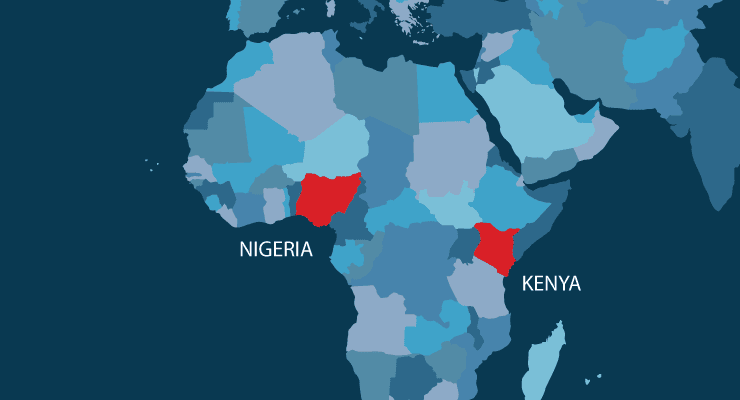The Institute of Human Virology (IHV) at the University of Maryland School of Medicine announced two significant grants comprising $13 million to strengthen infectious disease laboratory capacities and infrastructure in Kenya, and $10 million to enable early detection and rapid responses to new and emerging infectious disease threats in Nigeria.
This announcement follows recent IHV milestones including surpassing more than 1 million patients in overseas care and treatment, a $50 million grant in Zambia, and a $24.5 million grant in Botswana to combat each country’s HIV/AIDS epidemics.
“IHV continues to serve as a true global leader who can effectively partner with varying foreign governments and public-private sector entities to combat infectious disease,” said Robert C. Gallo, MD, the Homer & Martha Gudelsky Distinguished Professor of Medicine and Director of the Institute of Human Virology.
The five-year $13 million grant for Kenya, led by Sylvia Ojoo, MB, ChB, Assistant Professor of Medicine at the Institute of Human Virology, was awarded by the U.S. Centers for Disease Control and Prevention (CDC), and supports a partnership led by IHV including Kenya’s Ministry of Health, the National Public Health Laboratory Services, and the Kenya National Blood Transfusion Service, among others.
The collaboration will streamline government laboratory guidelines and policies to strengthen effectiveness in diagnostic testing for the prevention, surveillance, and treatment of infectious diseases such as HIV and Tuberculosis, among other HIV-related opportunistic infections.
Additionally, the U.S. Government has a new priority initiative led by the CDC to address growing concerns related to biosecurity in Nigeria. Global gaps were highlighted in the recent Ebola outbreak in West Africa. Building on IHV’s extensive global experience, CDC awarded IHV a five-year $10 million grant to partner with CDC-Nigeria and the Nigerian Ministry of Health to build in-country capacity and expertise to detect biosecurity threats early, and to respond rapidly and effectively to emerging infectious disease threats, such as Ebola.
“This a great opportunity for the IHV to build on our longer-term CDC partnership established by the U.S. President’s Emergency Plan For AIDS Relief (PEPFAR), and to extend our expertise to help operationalize programs targeting viruses of biosecurity importance,” said Dr. Redfield. “Kenya and Nigeria each have a high burden of HIV, and remain at significant risk for additional epidemics which are dependent on successful biosecurity infrastructures that these awards will help provide.”
In Kenya, the IHV’s Division of Clinical Care and Research already leads a team, in partnership with Kenya’s Ministry of Health and the University of Nairobi, which is creating and implementing what has proven to be a paradigm shift in the health workforce of HIV-related training by developing a national HIV integrated training course. The onsite course replaced more than 20 disparate curricula, reducing time away from work for training. The course was piloted and is currently being rolled out nationally, positioned to cut the unit cost of training by about tenfold.
In Nigeria, in addition to the IHV Division of Epidemiology and Prevention’s work with the Institute of Human Virology, Nigeria, the IHV Clinical Division has already successfully facilitated the launch of HIV/AIDS training hubs in 13 training institutions for nurses and community health extension workers and 44 military hospitals in Kaduna State. The IHV also currently incorporates HIV/AIDS topics in curriculum for MPH students, and launched a short course in HIV/AIDS for Doctors of the University of Nigeria.


